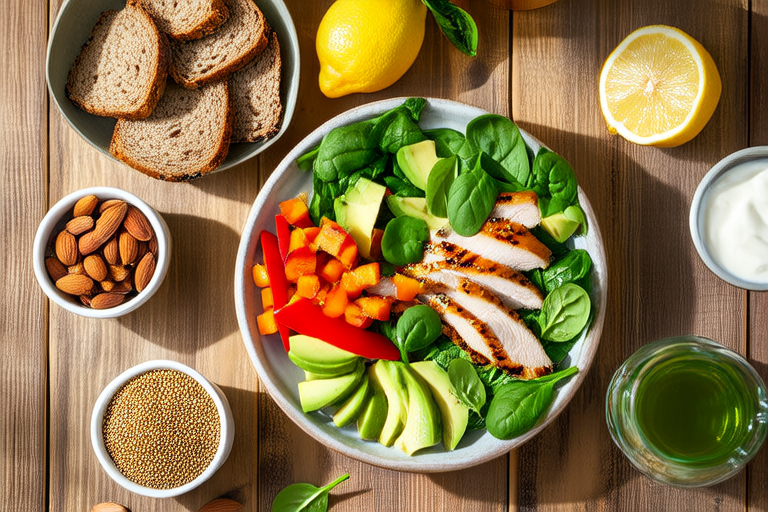Essential Guidelines for a Balanced and Healthy Diet
Introduction: The Importance of a Balanced Diet
A balanced diet is the cornerstone of good health, providing the body with the essential nutrients it needs to function optimally. In today’s fast-paced world, where convenience often takes precedence over nutrition, many individuals struggle to maintain healthy eating habits. However, prioritizing a balanced diet is not just about avoiding illness; it also enhances energy levels, supports mental well-being, and reduces the risk of chronic diseases such as obesity, diabetes, and heart disease. By understanding the principles of healthy eating and making informed choices, individuals can take control of their health and enjoy a higher quality of life.
Key Principles for Maintaining Healthy Eating Habits
To achieve a balanced diet, certain foundational principles must be followed. These guidelines provide a framework for making nutritious food choices while accommodating individual preferences and lifestyles.
Variety is Key
No single food contains all the nutrients the body requires. A diverse diet ensures that you consume a wide range of vitamins, minerals, and macronutrients. Incorporating different types of fruits, vegetables, grains, proteins, and healthy fats into your meals helps meet nutritional needs and prevents boredom.
Moderation Over Restriction
A healthy diet does not mean eliminating favorite foods entirely. Instead, moderation is key. Enjoying treats in small amounts while focusing on nutrient-dense options allows for flexibility without compromising overall health.
Whole Foods Over Processed Options
Prioritize whole, minimally processed foods whenever possible. These items are typically richer in nutrients and lower in additives like sugar, salt, and unhealthy fats. Examples include fresh fruits and vegetables, whole grains, lean proteins, and nuts.
Consistency Over Perfection
Healthy eating is a long-term commitment rather than a short-lived trend. Strive for consistency in your choices rather than aiming for perfection. Small, sustainable changes often yield better results than drastic overhauls.
Specific Recommendations for Nutrient-Rich Foods
Incorporating nutrient-rich foods into your diet is essential for maintaining optimal health. These foods provide the building blocks your body needs to thrive.
Fruits and Vegetables
Fruits and vegetables are packed with vitamins, minerals, fiber, and antioxidants. Aim to fill half your plate with these colorful options at every meal. Leafy greens like spinach and kale, vibrant berries, citrus fruits, and cruciferous vegetables like broccoli are particularly beneficial.
Whole Grains
Replace refined grains with whole grains to boost your intake of fiber and essential nutrients. Opt for brown rice, quinoa, oats, whole wheat bread, and barley instead of white bread, pasta, or sugary cereals.
Lean Proteins
Protein is crucial for muscle repair, immune function, and overall growth. Choose lean sources such as chicken, turkey, fish, eggs, beans, lentils, tofu, and low-fat dairy products. Fatty fish like salmon and mackerel are excellent sources of omega-3 fatty acids, which support heart and brain health.
Healthy Fats
Not all fats are created equal. Focus on unsaturated fats found in avocados, nuts, seeds, and olive oil. These fats promote heart health and help absorb fat-soluble vitamins like A, D, E, and K.
Dairy or Dairy Alternatives
Dairy products provide calcium and vitamin D, which are vital for bone health. If you’re lactose intolerant or prefer plant-based options, choose fortified alternatives like almond, soy, or oat milk.
Tips for Portion Control and Hydration
Even nutrient-rich foods can contribute to weight gain if consumed in excessive quantities. Portion control and proper hydration are essential components of a balanced diet.
Understanding Portion Sizes
Learning to recognize appropriate portion sizes can prevent overeating. Use visual cues to estimate servings: a serving of protein should be about the size of your palm, a serving of carbohydrates like rice or pasta should fit in your cupped hand, and a serving of fats like nuts or cheese should be no larger than your thumb.
Listening to Hunger Cues
Eat when you’re hungry and stop when you’re satisfied, not stuffed. Mindful eating—paying attention to the taste, texture, and aroma of your food—can help you tune into your body’s signals and avoid overindulgence.
Prioritizing Hydration
Water is essential for digestion, circulation, temperature regulation, and nutrient transport. Aim to drink at least eight glasses of water daily, adjusting for activity level and climate. Limit sugary beverages and opt for herbal teas or infused water for variety.
Strategies for Avoiding Common Dietary Pitfalls
While adopting a balanced diet is straightforward in theory, several common challenges can derail progress. Awareness and preparation are key to overcoming these obstacles.
Managing Emotional Eating
Stress, boredom, or sadness can lead to emotional eating, where food becomes a coping mechanism rather than fuel for the body. Identify triggers and develop alternative strategies, such as exercise, journaling, or talking to a friend, to manage emotions without turning to food.
Navigating Social Situations
Social gatherings often revolve around food, making it challenging to stick to healthy habits. Plan ahead by eating a nutritious snack before attending events, choosing healthier options when available, and practicing moderation with indulgent foods.
Resisting Marketing Tactics
Food marketing can make unhealthy options appear appealing through catchy slogans or misleading labels. Read ingredient lists and nutrition facts carefully to make informed decisions. Look for terms like “whole grain,” “low sodium,” or “no added sugar” to guide your choices.
Overcoming Convenience Culture
Fast food and pre-packaged meals are convenient but often lack nutritional value. Prepare meals and snacks at home to ensure they align with your dietary goals. Batch cooking and meal prepping can save time and reduce reliance on processed foods.
Conclusion: The Benefits of Adhering to These Guidelines
A balanced and healthy diet is more than a collection of rules—it’s a lifestyle choice that empowers individuals to live their best lives. By embracing variety, moderation, and whole foods, people can nourish their bodies and minds effectively. Practicing portion control and staying hydrated further enhances the benefits of healthy eating, while strategies to avoid common pitfalls ensure long-term success. Ultimately, adhering to these guidelines fosters improved physical health, increased energy, enhanced mental clarity, and a reduced risk of chronic diseases. With commitment and consistency, anyone can achieve the rewards of a balanced diet and enjoy a lifetime of wellness.










